Fragile X syndrome research shows PDE inhibitors may improve brain function and behavior, with promise for related neurodevelopmental disorders.
Read moreResearcher
Shionogi’s EXPERIENCE Phase 3 Clinical Trial of Zatolmilast in Fragile X Syndrome
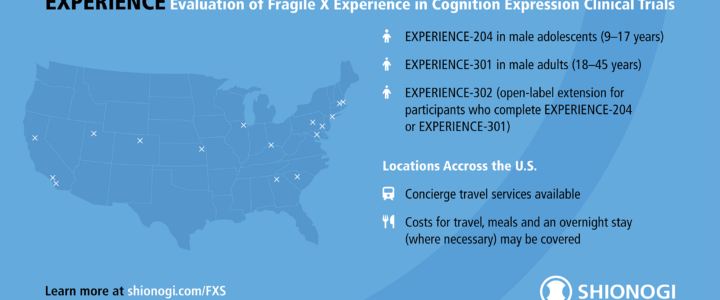
Shionogi’s EXPERIENCE clinical trials for Fragile X syndrome are nearing completion. Enrollment for the adult trial (EXPERIENCE-301) is now closed, while the adolescent trial (EXPERIENCE-204) is in its final phase. Learn more about the study, FRAXA’s role, and the open-label extension.
Read moreAdvancing Curative Therapy for Fragile X Syndrome: Turner Lab Secures $1M Grant

Fragile X syndrome research accelerates as the Turner Lab secures $1M to expand FRAXA-funded work on curative therapy targeting the missing FMRP protein.
Read moreFRAXA-Funded Research Explores ISRIB as a Potential Treatment for Fragile X

ISRIB for Fragile X syndrome is being studied as a potential treatment to restore brain function and social behavior. Researchers investigate its effects.
Read moreBK Channel Openers: A New Hope for Fragile X Treatment – Insights from Kaerus Bioscience CEO Robert Ring

Kaerus Bioscience’s BK channel openers for Fragile X syndrome are advancing through Phase 1 trials, offering hope for new treatments with FRAXA’s continued support.
Read moreInvestigating the Role of the Insulin Degrading Enzyme (IDE) in Fragile X Syndrome
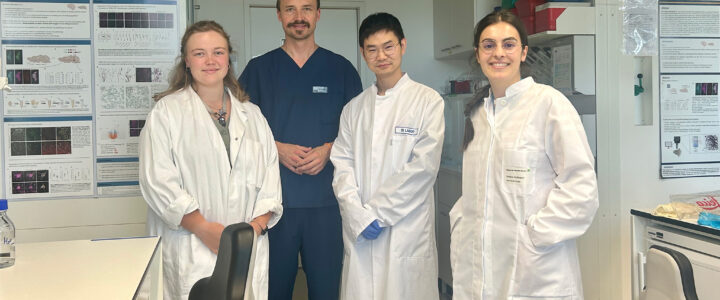
FRAXA Research Foundation awards a $100,000 grant to Ludwig Maximilian University researchers to investigate the role of insulin-degrading enzyme (IDE) in Fragile X syndrome, exploring new therapeutic approaches for cognitive and metabolic challenges in FXS.
Read moreAltered Physiology of Primary Visual Cortex in Fragile X Syndrome
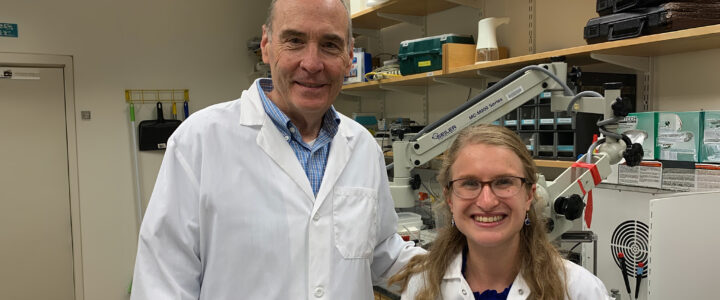
Discover how a $100,000 FRAXA grant supports research at MIT targeting neuron dysfunction in Fragile X, aiming to develop new therapies to improve sensory processing and behavior.
Read moreGene Editing of FMR1 to Correct FXS Phenotypes in Mice

FRAXA awarded a $100,000 grant to Dr. Davidson and Dr. Yrigollen at Children’s Hospital of Philadelphia to explore gene editing tools aimed at treating Fragile X syndrome by correcting FMR1 mutations in a unique mouse model.
Read moreFragile X Unplugged: Establishing Mobile EEG as the Next Frontier

Discover how a $100,000 FRAXA grant awarded to Cincinnati Children’s Hospital is advancing Fragile X research by simplifying EEG technology for home use, improving clinical trial accessibility and efficiency.
Read moreMarvel Biosciences Partners with FRAXA to Test MB204 for Fragile X Syndrome

Discover how Marvel Biosciences and FRAXA Research Foundation are collaborating to test MB204, a promising new treatment for Fragile X syndrome, building on groundbreaking adenosine receptor research.
Read moreIdentification of the Proteome of Active and Silenced FMR1 Alleles in Human Stem Cells
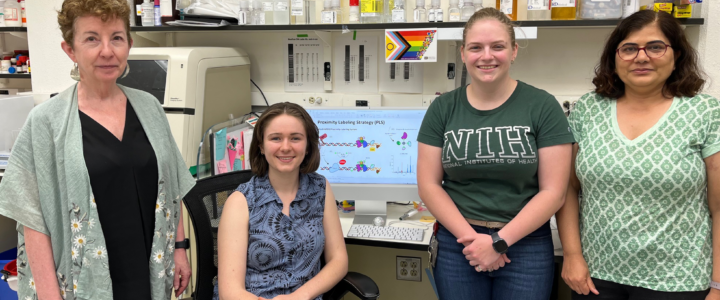
This team’s ultimate goal is to find a way to restore full function of FMR1, the gene which underlies Fragile X syndrome. With this grant, they will use advanced technologies to find the specific proteins that are involved in keeping FMR1 silenced. Understanding precisely why and how the gene is silenced is a key step toward finding a solution.
Read moreTo Interrogate the Developmental Timing for Treating Fragile X Syndrome

Are there critical periods in Fragile X syndrome? Will treatment work in adults as well as in children? This team aims to answer these questions.
Read moreQurAlis and UMass Chan Advance Fragile X Syndrome Treatment using ASOs (Antisense Oligonucleotides)

Explore how QurAlis and UMass Chan are revolutionizing Fragile X syndrome treatment using advanced ASO technology, setting new standards in therapeutic development.
Read moreBK Channel Openers: A New Drug for Fragile X Is Ready for Clinical Trials

Discover the promising new BK channel opener, SPG601, now entering clinical trials for Fragile X syndrome. Learn about its potential to restore synaptic function and address core symptoms.
Read moreRenewed Hope: Navigating Towards a Cure for Fragile X Syndrome

Discover how Dr. Peter Todd’s latest Fragile X Syndrome research offers hope for advanced treatments and a possible cure, marking a new era in FXS therapy.
Read moreInside the FRAXA Drug Validation Initiative: Advancing Fragile X Treatments
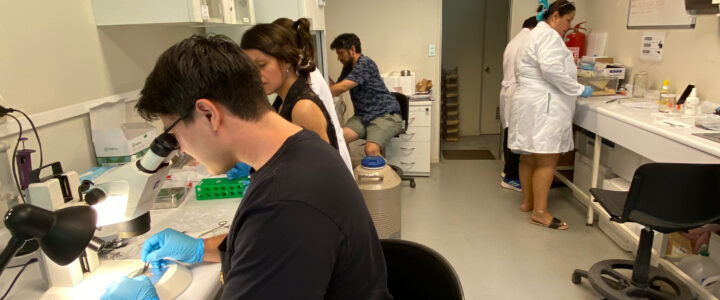
Explore how the FRAXA Drug Validation Initiative is revolutionizing Fragile X syndrome treatment, leading the charge towards innovative therapies and hope for affected families.
Read morePharmacologically Activating mGluR7 as a Novel Therapy for Fragile X Syndrome

Join Dr. Tsai and Dr. Kumar on a journey into novel treatment avenues for Fragile X syndrome. Learn how activating mGluR7 could be a game-changer, opening up uncharted therapeutic territory.
Read moreTwo-Med Combo Normalized Behavior, Improved Memory in Fragile X Mice

Treating Fragile X syndrome will likely require a combination of drugs, as a single medication may not address all symptoms. At FRAXA-DVI, Dr. Patricia Cogram and her team recently tested a combination of two investigational new drugs in Fragile X mice, with support from Healx. Together ibudilast and gaboxadol rescued a wide array of symptoms in the mice.
Read moreRecruiting: Unveiling Probiotic Potential in Fragile X Syndrome Clinical Trial

First of its kind in Serbia, this clinical trial explores probiotic intervention as a potential treatment avenue for Fragile X syndrome.
Read morePharmacological Modulation of Nicotinic Signaling
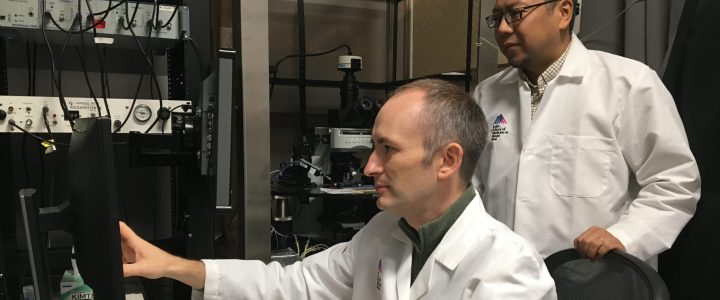
Nicotine — familiar to any smoker — tickles nicotinic acetylcholine receptors in the brain. These receptors are key to important brain functions including learning and memory. This team will explore whether drugs that dampen these receptors can improve cognitive function in Fragile X.
Read moreAstrocyte Contribution to Sensory Hypersensitivity in Fragile X Syndrome
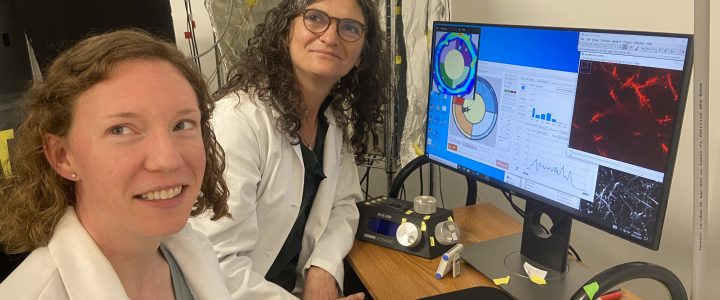
Most Fragile X research has focused on one type of brain cells: neurons. But mounting evidence point to problems with astrocytes, star-shaped cells which are vitally important to normal brain function. This team is working to understand how astrocytes are involved in Fragile X and develop treatment approaches that targets astrocytes alone.
Read moreReactivating the FMR1 Gene to Reverse Fragile X Syndrome

FRAXA Research Foundation is dedicated to funding breakthrough research, providing $240,000 to reactivate the FMR1 gene to combat Fragile X Syndrome, with the goal of restoring vital protein function and advancing towards a cure.
Read moreC-subunit Mitochondrial Leak Channel in Fragile X Syndrome

Explore Yale’s groundbreaking study on mitochondrial leak channels, set to revolutionize Fragile X syndrome treatment. Funded by a $100,000 FRAXA grant.
Read moreSomatosensory Processing as a Therapeutic Target for Fragile X Syndrome

Awarded a FRAXA Research grant, Dr. Andrew Stanfield, Dr. Leena E. Williams, and Dr. Damien Wright are set to explore somatosensory processing (sense of touch) in Fragile X syndrome at the University of Edinburgh. Their aim? A noninvasive touch test that could set the stage for future clinical trials in FXS.
Read moreAntisense Oligonucleotides (ASOs) to restore FMRP in Human Fragile X Cerebral Organoids

Explore Dr. Richter’s encouraging results with ASOs for Fragile X syndrome. A $100,000 grant now fuels pivotal studies needed to advance toward ASO therapy.
Read more
